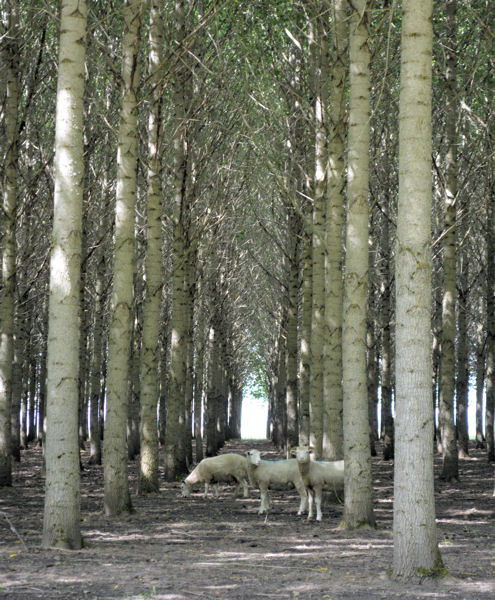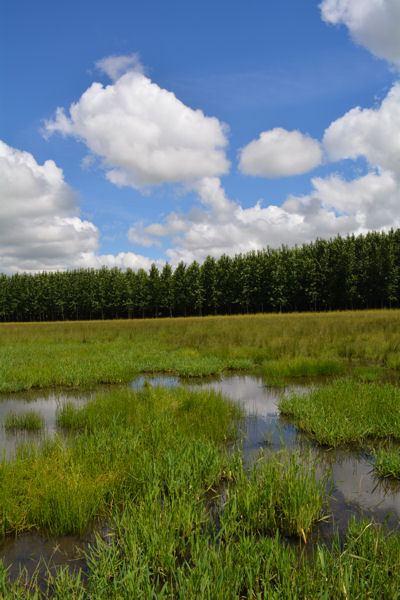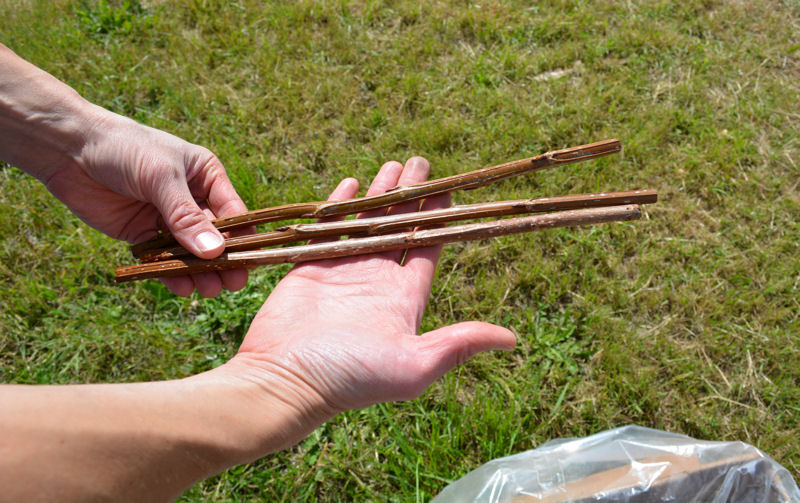
More than 150 sheep help poplar trees grow on Biocycle Farm, located in Eugene, Ore., by eating tall grasses that consume valuable water and nutrients. Photo courtesy of Metropolitan Wastewater Management Commission (MWMC; Lane County, Ore.).
Biocycle Farm, a large farm in Eugene, Ore. sustained entirely by recycled water, doesn’t rely solely on herbicides or machines to maintain the 88,000 poplar trees planted on the property. The Metropolitan Wastewater Management Commission (MWMC; Lane County, Ore.), which manages the land, saves almost $3500 in labor and fuel costs each year by employing more than 150 sheep to “mow” the grass.
Because poplar trees develop quickly and require large amounts of water and nutrients to grow, trimming tall grasses as often as possible is important to ensure the trees receive enough sustenance. But wet conditions at the farm caused mowing equipment to get stuck and create ruts in tree rows. “The combination of tall grass and trees blocking the sun caused the site to take several weeks of good weather to dry out,” said Randy Gray of MWMC.
In the three years since MWMC first introduced sheep to control vegetation in the farm’s dense poplar groves, results have been promising. They are like the basic reel mower but does not need any fuel. “It takes the sheep about two weeks to eat the grass down, which helps the site dry out much sooner,” Gray said. And the flock is more delicate than mechanical mowers and tractors, reducing the effect on the land.
MWMC treats more than 113 million L (30 million gal.) of wastewater each day from around 220,000 customers located in the cities of Springfield and Eugene, Ore. Through MWMC, the city of Eugene operates and maintains a Biosolids Management Facility (BMF).

In addition to being irrigated by recycled wastewater, the farm’s low-lying grasslands receive large helpings of rainwater. Photo courtesy of MWMC.
Planted along the outskirts of BMF, the farm’s trees benefit from nutrient-rich fertilizer produced from the facility’s biosolids. Solids generated by the biological treatment of wastewater are pumped into BMF lagoons where gradual decomposition eliminates harmful pathogens. Dried biosolids are processed into fertilizer, which MWMC calls Biocycle, that is applied to local farmland. For more than 20 years, MWMC has provided Biocycle fertilizer to local farmers. In 2003, the first Biocycle Farm poplar trees were planted using the fertilizer.
“The value of the poplar trees to our biosolids and recycled water programs remains the driving force behind operating the Biocycle Farm. The high nitrogen and water uptake rates of the poplar trees add flexibility and reliability to our land application programs,” Gray said. “The idea of sheep grazing to help control vegetation makes sense, and the concept is not a new one.”
Though the farm pays no wages to its woolly workers, the sheep are entitled to as much grass as they can eat. Thanks to a long-standing relationship with the local farming community, MWMC was able to negotiate with the flock’s owner to provide free forage in exchange for free vegetation control.

Poplar trees require large amounts of water and nutrients to grow. Once harvested, poplar wood can be used for a variety of construction purposes. Photo courtesy of MWMC.
Farm grass and trees are irrigated with treated wastewater that meets strict water quality standards. Each year, irrigation is stopped 6 months prior to sheep grazing, and the sheep are removed before irrigation resumes to ensure that the grass is safe for consumption.
MWMC staff hopes that the farm can turn this and other types of sustainable concepts into financial independence. Farm administrators set a goal of offsetting operating costs without compromising their commitment to recycling with such measures as replacing lawn mowers with livestock and selling tree byproducts that can generate electricity.
Learn more about MWMC’s philosophy and practices in its video series.
— Justin Jacques, WEF Highlights








September 19, 2016
Featured